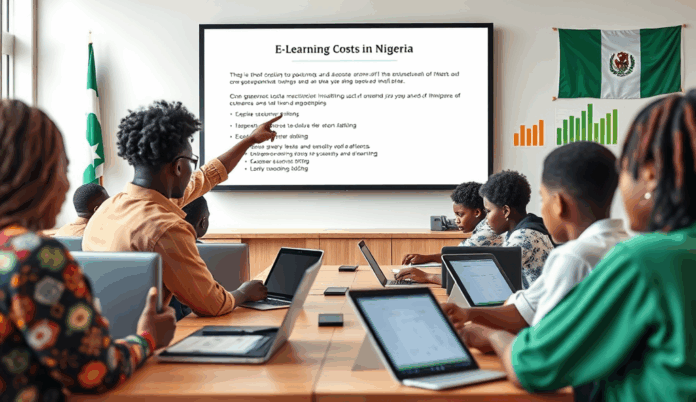Introduction to E-Learning Costs in Nigeria for University Students
E-learning costs in Nigeria vary widely, with platforms like Udemy offering courses from ₦5,000 while specialized certifications can exceed ₦100,000. Nigerian students often face additional expenses like data subscriptions, which average ₦3,500 monthly according to NCC 2023 reports.
Budget-friendly e-learning solutions in Nigeria must balance affordability with quality, as seen in platforms like Coursera’s financial aid program. Local alternatives like EduNgr provide courses at lower rates but may lack international accreditation.
Understanding these cost structures helps students compare e-learning platform charges effectively before investing. The next section breaks down how different platforms structure their pricing models for Nigerian learners.
Key Statistics

Understanding the Basics of E-Learning Platforms
E-learning costs in Nigeria vary widely with platforms like Udemy offering courses from ₦5000 while specialized certifications can exceed ₦100000
E-learning platforms are digital ecosystems that deliver educational content through interactive modules, video lectures, and assessments, with Nigerian options ranging from global giants like Udemy to local services like EduNgr. These platforms typically offer self-paced learning, though some provide live sessions requiring stable internet—a key consideration given Nigeria’s average ₦3,500 monthly data costs reported by NCC.
The core value proposition lies in accessibility, allowing Nigerian students to bypass geographical barriers while balancing affordability and quality, as highlighted earlier with Coursera’s financial aid model. However, platform selection requires careful evaluation of accreditation, especially when comparing budget-friendly local options against internationally recognized certifications.
Understanding these fundamentals helps students navigate the subsequent analysis of factors influencing e-learning costs in Nigeria, from currency fluctuations to localized pricing strategies.
Factors Influencing E-Learning Costs in Nigeria
Currency exchange rates significantly impact e-learning costs as platforms like Coursera and Udemy price courses in dollars exposing Nigerian students to naira depreciation risks
Currency exchange rates significantly impact e-learning costs, as platforms like Coursera and Udemy price courses in dollars, exposing Nigerian students to naira depreciation risks—a single dollar fluctuation can add ₦500-₦1,000 to monthly subscriptions. Local platforms like EduNgr avoid this by pricing in naira but may lack the course variety of international counterparts, creating a trade-off between affordability and content breadth.
Internet infrastructure also plays a critical role, with NCC data showing Nigerians spend 12-18% of average student budgets on mobile data for streaming lectures, disproportionately affecting those in regions with unstable networks. Platforms requiring high bandwidth for live sessions or HD videos become costlier compared to text-based or downloadable alternatives, making offline accessibility a key cost determinant.
Finally, certification fees and regional pricing strategies create disparities, as global platforms often charge extra for verified certificates (Coursera’s ₦15,000 per course) while local alternatives like Teesas offer free completion badges. These variations necessitate careful comparison, setting the stage for evaluating truly affordable e-learning platforms in Nigeria.
Affordable E-Learning Platforms Available in Nigeria
Local platforms like EduNgr offer courses from ₦5000-₦20000 while Teesas provides specialized STEM programs at ₦15000 monthly significantly cheaper than dollar-priced alternatives
For Nigerian students seeking budget-friendly e-learning solutions, local platforms like EduNgr and Teesas offer courses priced in naira, eliminating currency exchange risks while providing specialized content on African business practices and STEM subjects. These platforms also optimize data usage with downloadable materials, addressing the internet infrastructure challenges highlighted earlier.
International alternatives like Alison and Khan Academy remain accessible with free foundational courses, though advanced certifications may incur dollar-based fees similar to Coursera. Their text-based modules reduce bandwidth demands, making them practical for students in low-network areas.
Platforms such as Udacity now offer regional scholarships and income-share agreements, reducing upfront costs for Nigerian learners. This bridges the gap between global content diversity and local affordability, setting the stage for detailed cost comparisons in the next section.
Comparing Costs of Popular E-Learning Platforms
Nigerian students benefit from government-backed programs like the National Universities Commission’s partnerships with Coursera offering free access to 3800 courses for 100000 learners annually
Local platforms like EduNgr offer courses from ₦5,000-₦20,000, while Teesas provides specialized STEM programs at ₦15,000 monthly, significantly cheaper than dollar-priced alternatives. These naira-based options avoid forex fluctuations, making them ideal for Nigerian students managing tight budgets.
International platforms like Coursera charge $49-$99 per course, with certificates adding $30-$100, while Alison’s free courses transition to $20-$200 for diplomas. Khan Academy remains entirely free but lacks certifications, highlighting the trade-offs between affordability and credential value.
Udacity’s income-share agreements cap payments at 10% of earnings post-graduation, contrasting with Udemy’s one-time ₦3,500-₦15,000 fees per course. This cost diversity prepares students to evaluate platforms based on their financial priorities, a skill explored next in choosing budget-friendly options.
How to Choose the Right E-Learning Platform on a Budget
With strategic planning and informed choices Nigerian students can access quality e-learning without financial strain
Prioritize naira-denominated platforms like EduNgr or Teesas if forex volatility concerns you, as their ₦5,000-₦20,000 courses eliminate dollar conversion risks. For certification-focused learners, compare Coursera’s $49-$99 fees against Udemy’s one-time ₦3,500-₦15,000 payments to balance affordability and credential value.
Assess hidden costs like certificate fees, which add $30-$100 on Alison despite free course access, or Udacity’s 10% income-share model for long-term financial impact. Nigerian students should verify platform payment flexibility, as some accept local options like bank transfers or USSD to avoid card-related charges.
Align platform choice with learning goals—Khan Academy suits skill-building without certifications, while Teesas’ ₦15,000 STEM programs offer structured upskilling. This strategic evaluation sets the stage for implementing cost-saving tactics, explored next in reducing e-learning expenses.
Tips for Reducing E-Learning Costs as a University Student
Leverage free trials and discounts on platforms like Coursera, which often waive fees for Nigerian students through initiatives like Coursera for Campus, saving up to 80% on course fees. Bundle courses during Udemy’s frequent ₦2,500 flash sales instead of paying full ₦15,000 prices, maximizing value from their one-time payment model.
Opt for peer-to-peer learning exchanges on Telegram groups like Naija E-Learners, where students share free course materials and split subscription costs for platforms like Skillshare. Verify if your university partners with e-learning providers, as some Nigerian institutions offer subsidized access to platforms like LinkedIn Learning.
Monitor forex rates when paying for dollar-denominated courses, using parallel market rates via platforms like AbokiFX to time payments strategically. These tactics complement existing government and institutional support programs, which we’ll explore next for broader affordability solutions.
Government and Institutional Support for Affordable E-Learning
Building on individual cost-saving strategies, Nigerian students benefit from government-backed programs like the National Universities Commission’s (NUC) partnerships with Coursera, offering free access to 3,800 courses for 100,000 learners annually. State initiatives like Lagos State’s Eko Digital Skills program provide subsidized certifications from global platforms, reducing e-learning costs by up to 70% for verified students.
Federal interventions include the Central Bank’s Creative Industry Financing Initiative, which offers low-interest loans covering e-learning subscriptions for students in accredited institutions. Universities like UNILAG and Covenant University negotiate institutional discounts with platforms like edX, passing savings directly to students through their virtual learning environments.
These systemic efforts create sustainable pathways for affordable digital education, setting the stage for real-world success stories we’ll examine next. By combining policy support with the earlier discussed peer-sharing tactics, Nigerian students can fully optimize their e-learning investments.
Success Stories of Nigerian Students Using Affordable E-Learning Platforms
Lagos-based computer science student Aisha Mohammed leveraged the NUC-Coursera partnership to complete Google’s IT Support Certificate, landing a remote internship with a U.S. firm while still at UNILAG.
Her story mirrors findings from a 2023 NUC report showing 42% of beneficiaries secured income-generating opportunities within six months of certification.
Kaduna State University’s Ahmed Bello utilized the Central Bank’s low-interest loan to access Udacity’s Nanodegree programs, subsequently developing AI solutions for local farmers. Such outcomes validate federal interventions, with over 15,000 students accessing premium e-learning content through subsidized financing since 2022.
These triumphs demonstrate how combining institutional support (like Covenant University’s edX discounts) with peer-shared strategies creates transformative learning pathways. As we’ll explore in closing, such models make quality digital education sustainably accessible across Nigeria’s academic landscape.
Conclusion: Making E-Learning Affordable for Nigerian University Students
With strategic planning and informed choices, Nigerian students can access quality e-learning without financial strain. Platforms like Coursera and Udemy offer financial aid, while local options like EduTech Nigeria provide budget-friendly courses tailored to Nigerian curricula.
Government initiatives, such as the National Broadband Plan, aim to reduce internet costs, further lowering barriers to digital education.
Comparing e-learning costs in Nigeria reveals significant savings when opting for annual subscriptions over monthly plans. Students can also leverage free resources from universities like UNILAG’s open courseware or MIT OpenCourseWare.
Peer learning groups and shared accounts (where permitted) present additional ways to split expenses while maintaining access.
The future of affordable e-learning in Nigeria hinges on continued policy support and student awareness of cost-saving options. By combining institutional discounts, data-saving strategies, and free certifications, students can maximize value.
As explored throughout this article, smart choices make quality education accessible despite economic challenges.
Frequently Asked Questions
How can I access Coursera courses for free as a Nigerian student?
Apply for Coursera's Financial Aid program or check if your university participates in the NUC-Coursera partnership offering free access to 3800 courses.
What are the most affordable local e-learning platforms in Nigeria?
Try EduNgr (₦5000-₦20000 per course) or Teesas (₦15000 monthly) for naira-denominated courses with lower data requirements.
Can I reduce data costs when using international e-learning platforms?
Download course materials during off-peak hours or use text-based platforms like Khan Academy to minimize streaming costs.
Where can I find scholarships for Udacity Nanodegrees in Nigeria?
Check Udacity's regional scholarships page or apply for the Central Bank's Creative Industry Financing Initiative for low-interest learning loans.
How do I verify if an e-learning certificate is recognized in Nigeria?
Cross-check with the National Universities Commission (NUC) database or consult your university's career center before enrolling.


